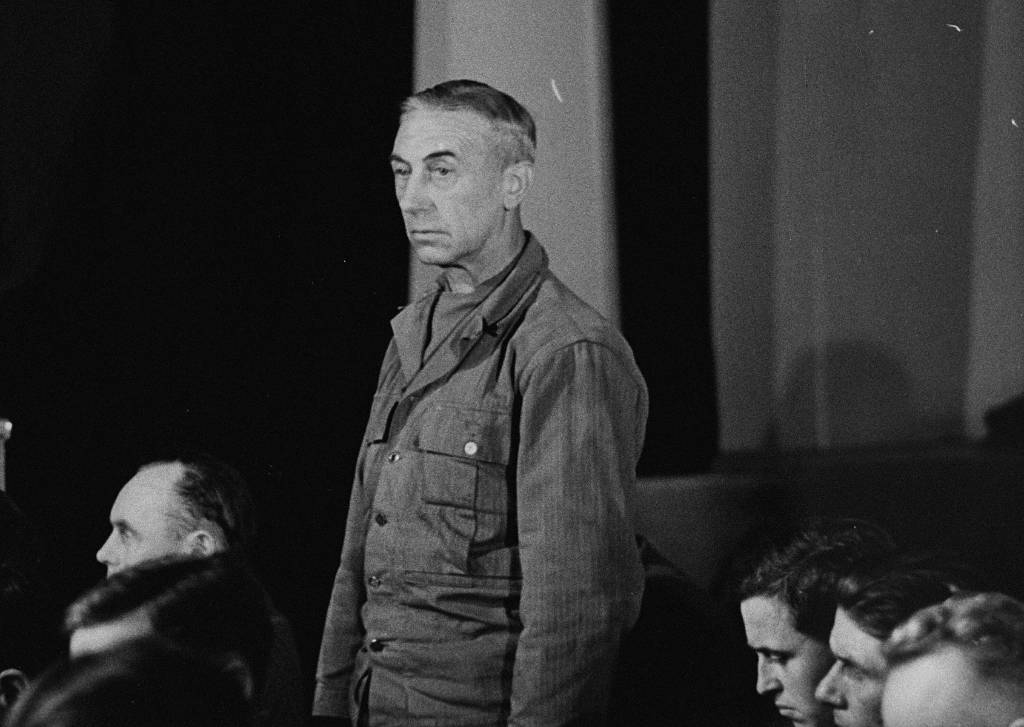Prosecution
In the first few days after the liberation of the Mauthausen camp, US authorities were already beginning investigations of potential Nazi criminals. They detained thousands of SS members and former prisoner functionaries in internment camps under ‘automatic arrest’ measures. Over the following months, the French, British and Soviet occupiers also began investigations in their own zones, searching for suspects. At the same time, special temporary legislation for prosecution of Nazi crimes was being developed in many European countries, for example Poland, Czechoslovakia and Austria itself.
 In the Mauthausen-Gusen camp trials that were held by a US military court on the grounds of the former Dachau concentration camp, the Melk camp commandant Julius Ludolph was condemned to death by hanging for his crimes in the Melk concentration camp and other Mauthausen subcamps. He was executed in Landsberg am Lech in May 1947. Photo: NARA/USHMM, Dachau 1946.The crimes committed in the Melk subcamp were dealt with both by Allied military courts and Volksgerichte (‘People’s Courts) at Austrian national level. In total, more than 20 former members of the camp administration and the guard units (mainly Luftwaffe soldiers), as well as former prisoner functionaries and civilians, were put on trial. Among them was the Melk camp commandant Julius Ludolph and the head of the provisions store Otto Striegel. Both were found guilty in an American Mauthausen trial held on the grounds of the former Dachau concentration camp in May 1946 and hanged one year later in Landsberg am Lech. In 1947 and 1949 respectively, two former kapos from Melk, Fidel Balbas and Uli Schmidt, were found guilty by a French military court in Rastatt of having murdered many of their fellow prisoners through severe beatings. They too were executed. The SS medical orderly Gottlieb Muzikant, responsible for numerous murders in the Melk prisoners’ infirmary, was also convicted. In 1960 he was given 21 life sentences by the Fulda district court in West Germany. The Volksgericht at the regional court of Vienna passed sentences in a total of three trials in connection with crimes committed in the Melk subcamp. The trials were of Edmund Schödl, a former civilian electrician from the company Felten und Gilleaume who had worked in Melk (three years’ imprisonment), the former sub-kapo Joseph Fischer (not guilty) and Franz Höger, a former Wehrmacht platoon commander who had commanded a unit guarding prisoners (ten years’ imprisonment).
In the Mauthausen-Gusen camp trials that were held by a US military court on the grounds of the former Dachau concentration camp, the Melk camp commandant Julius Ludolph was condemned to death by hanging for his crimes in the Melk concentration camp and other Mauthausen subcamps. He was executed in Landsberg am Lech in May 1947. Photo: NARA/USHMM, Dachau 1946.The crimes committed in the Melk subcamp were dealt with both by Allied military courts and Volksgerichte (‘People’s Courts) at Austrian national level. In total, more than 20 former members of the camp administration and the guard units (mainly Luftwaffe soldiers), as well as former prisoner functionaries and civilians, were put on trial. Among them was the Melk camp commandant Julius Ludolph and the head of the provisions store Otto Striegel. Both were found guilty in an American Mauthausen trial held on the grounds of the former Dachau concentration camp in May 1946 and hanged one year later in Landsberg am Lech. In 1947 and 1949 respectively, two former kapos from Melk, Fidel Balbas and Uli Schmidt, were found guilty by a French military court in Rastatt of having murdered many of their fellow prisoners through severe beatings. They too were executed. The SS medical orderly Gottlieb Muzikant, responsible for numerous murders in the Melk prisoners’ infirmary, was also convicted. In 1960 he was given 21 life sentences by the Fulda district court in West Germany. The Volksgericht at the regional court of Vienna passed sentences in a total of three trials in connection with crimes committed in the Melk subcamp. The trials were of Edmund Schödl, a former civilian electrician from the company Felten und Gilleaume who had worked in Melk (three years’ imprisonment), the former sub-kapo Joseph Fischer (not guilty) and Franz Höger, a former Wehrmacht platoon commander who had commanded a unit guarding prisoners (ten years’ imprisonment).